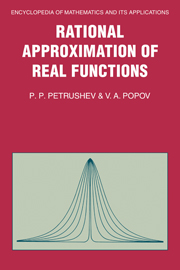Book contents
- Frontmatter
- Contents
- Preface
- Acknowledgements
- 1 Qualitative theory of linear approximation
- 2 Qualitative theory of the best rational approximation
- 3 Some classical results in the linear theory
- 4 Approximation of some important functions
- 5 Uniform approximation of some function classes
- 6 Converse theorems for rational approximation
- 7 Spline approximation and Besov spaces
- 8 Relations between rational and spline approximations
- 9 Approximation with respect to Hausdorff distance
- 10 The o-effect
- 11 Lower bounds
- 12 Padé approximations
- Appendix: Some numerical results
- References
- Author index
- Notation and subject index
11 - Lower bounds
Published online by Cambridge University Press: 05 August 2013
- Frontmatter
- Contents
- Preface
- Acknowledgements
- 1 Qualitative theory of linear approximation
- 2 Qualitative theory of the best rational approximation
- 3 Some classical results in the linear theory
- 4 Approximation of some important functions
- 5 Uniform approximation of some function classes
- 6 Converse theorems for rational approximation
- 7 Spline approximation and Besov spaces
- 8 Relations between rational and spline approximations
- 9 Approximation with respect to Hausdorff distance
- 10 The o-effect
- 11 Lower bounds
- 12 Padé approximations
- Appendix: Some numerical results
- References
- Author index
- Notation and subject index
Summary
In the previous chapters a number of estimates for rational approximation were established. Here we shall be concerned with the exactness of these estimates in the sense of definitions 5.1–5.3 from section 5.1. We use alternance techniques based on some variants of the well-known Chebyshev theorem and Vallée-Poussin theorem for rational approximation.
In section 11.1 there will be given some relatively simple lower bounds, almost all of which are not purely rational in scope. That is, almost all of them are valid for approximation by piecewise monotone functions or piecewise convex functions, particularly for spline approximation. In section 11.2 a non-trivial lower bound is obtained for the rational uniform approximation of functions of bounded variation and given modulus of continuity. Other lower bounds which can be analogously obtained will be omitted.
Some simple lower bounds
In this section we give some relatively elementary lower bounds for rational approximations which are not intrinsically dependent on the nature of the rational functions as an approximating tool. These bounds are based on some more general properties of the rational functions such as piecewise monotony and piecewise convexity.
Negative results for uniform approximation of continuous functions with given modulus of smoothness
In the preceding chapters classes of functions have been found which can be approximated by rational functions better than by polynomials. In this section we show that in the class of all continuous functions with a given modulus of smoothness the rational functions are in general not better than the polynomials as an approximation tool in the uniform metric.
- Type
- Chapter
- Information
- Rational Approximation of Real Functions , pp. 308 - 328Publisher: Cambridge University PressPrint publication year: 1988



